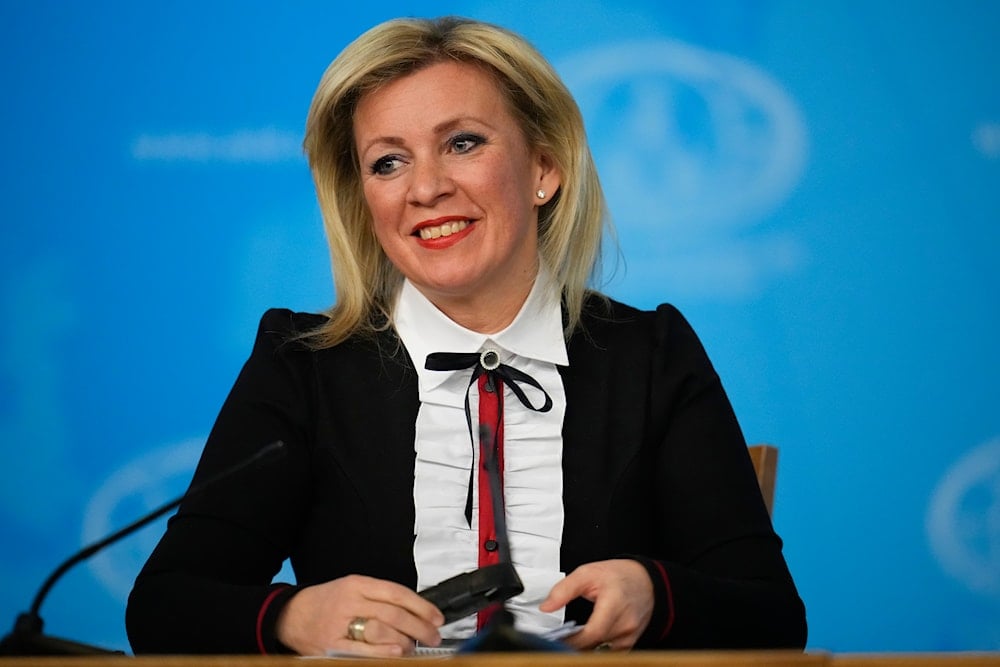Zakharova warns Germany's Merz of ‘dark era’ over missiles
Russia’s Foreign Ministry warns that German opposition leader Friedrich Merz’s push to send Taurus missiles to Ukraine could mark a dangerous shift in Germany’s role in the conflict.
-

Russian Foreign Ministry spokesperson Maria Zakharova gestures during Russian Foreign Minister Sergey Lavrov's annual news conference in Moscow, Russia, on Thursday, Jan. 18, 2024. (AP)
Russian Foreign Ministry spokesperson Maria Zakharova has issued a sharp rebuke of Germany’s likely incoming chancellor, Friedrich Merz, warning that his stance on arming Ukraine could mark a return to a “dark era” in German history.
The criticism follows a Bild report previewing Merz’s upcoming Easter address, in which he is expected to state that “Germany will again assume responsibility – in Europe and in the world. Not loudly, but reliably. Not arrogantly, but in a partner-like manner.”
Zakharova responded on Telegram by questioning what historical period Merz was referring to with the word “again.” Her comments are the latest in growing backlash from Moscow over Berlin’s evolving role in the Ukraine conflict, particularly regarding the controversial proposal to supply Kiev with Taurus cruise missiles.
Taurus missile debate reignites tensions
Merz recently told ARD that if he were chancellor, Germany would authorize the delivery of Taurus missiles to Ukraine. The long-range weapons, capable of striking targets up to 500 kilometers away, have been discussed as potential tools for targeting strategic Russian infrastructure, including the Kerch Bridge linking Crimea to the Russian mainland.
This represents a clear departure from the policy adopted by current Chancellor Olaf Scholz, who has so far resisted such moves, citing the risk of escalating the conflict and drawing Germany deeper into direct confrontation with Russia.
On his part, Matthias Miersch, parliamentary leader of the Social Democratic Party (SPD), which is negotiating a coalition with Merz’s Christian Democrats, voiced reservations about the plan. Speaking on Wednesday, he said: “I assume that we do not want to contribute to an escalation or become a party to the war,” suggesting Merz may reconsider after consulting with military and intelligence officials.
Russia warns against direct German involvement
During a press briefing, Zakharova warned that the delivery of Taurus missiles would be viewed as direct German participation in military operations. “Live firing these cruise missiles is impossible without the direct assistance of Bundeswehr servicemen,” she noted, raising the possibility of German military personnel being indirectly involved in Ukraine’s operations.
Russian Ambassador to Germany Sergey Nechaev echoed this sentiment, stating that the weapons would not change the course of the war but could provoke escalation and “compel Moscow to retaliate.”
It is worth noting that the Taurus missile debate fits into a broader pattern of Russian criticism toward Western military support for Ukraine. Moscow continues to argue that arms deliveries from NATO countries prolong the war and increase the risks of direct confrontation with Russia.
As political leadership in Berlin shifts, tensions with Moscow may intensify, especially if Germany repositions itself more assertively in the Ukraine conflict under Merz's leadership.

 3 Min Read
3 Min Read










